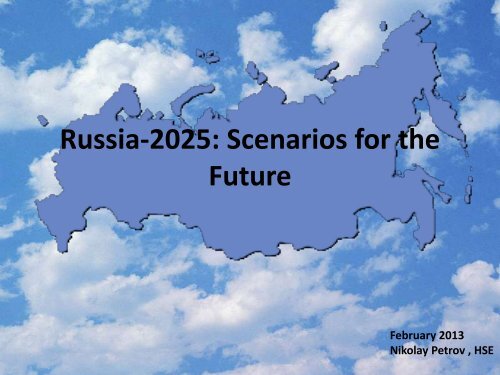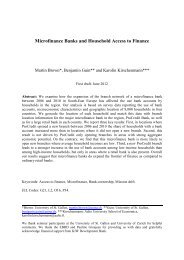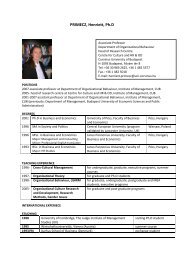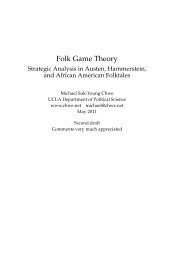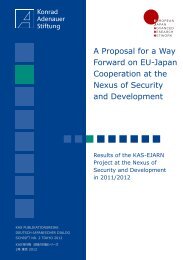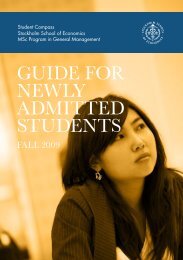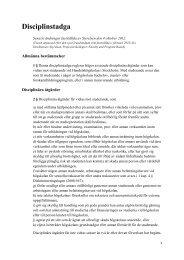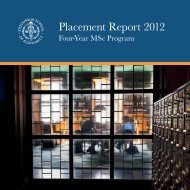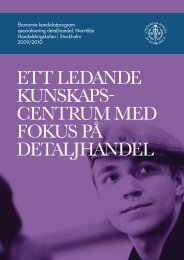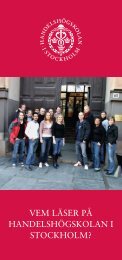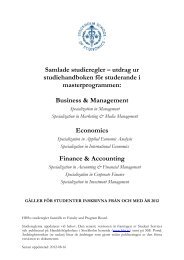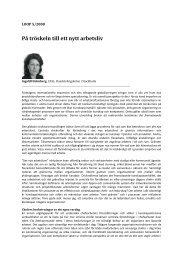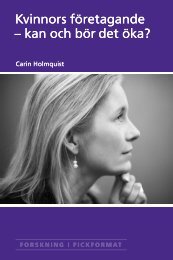Russia-2025: Scenarios for the Future
Russia-2025: Scenarios for the Future
Russia-2025: Scenarios for the Future
Create successful ePaper yourself
Turn your PDF publications into a flip-book with our unique Google optimized e-Paper software.
<strong>Russia</strong>-<strong>2025</strong>: <strong>Scenarios</strong> <strong>for</strong> <strong>the</strong><strong>Future</strong>February 2013Nikolay Petrov , HSE
Basics of OMDSubstitutions in Putin’s <strong>Russia</strong>2012 (8) - The Council of lawmakers; Putin’s strategic cabinet at <strong>the</strong>Kremlin with his <strong>for</strong>mer key ministers, presidential Commission onfuel, energy, and environment, Ministry/ corporation on <strong>the</strong> FarEast; electronic voting (Presidential council on civil society);municipal filters at gubernatorial elections; Center to promotelawmaking at ISEPI; ombudsmen on entrepreneurs’ affairs.Dynamics of major substitutes’ emergence2233 3681999 2000 2001 2002 2003 2004 2005 2006 2007 2008 2009 2010 2011 20122011 (6) – All-<strong>Russia</strong>n Popular Front; Strategy-2020 expert group and <strong>the</strong> Institute of Socio-Economicand Political Studies (ISEPI); <strong>the</strong> United <strong>Russia</strong> primaries; investment ombudsmen; <strong>the</strong> Agency <strong>for</strong>Strategic Initiatives; <strong>the</strong> “Broad Government”.
Institutions-substitutionsFive weakened democratic institutions and <strong>the</strong>irsubstitutions in <strong>Russia</strong> at <strong>the</strong> federal levelState DumaPublic ChamberFederation CouncilConsultative councils, commissions attached topresidentState Council and its PresidiumCouncil of LegislatorsPolitical partiesIndependent mediaGovernment‘Loyal opposition’ parties and movementsState corporationsRegional political machinesPublic reception officesRegional networks <strong>for</strong> collecting letters from citizensFSB, o<strong>the</strong>r secret servicesPollstersPresidential administrationState corporationsSecurity CouncilElite ‘clubs’
Institutions-substitutionsThree weakened democratic institutions and <strong>the</strong>irsubstitutions in <strong>Russia</strong> at <strong>the</strong> regional levelFederal andregional bodies ofexecutive powerPopularly electedheads of regionsand ofmunicipalitiesDirect electionsPlenipotentiary presidential envoys to federaldistricts; chief federal inspectorsPresidential appointees confirmed by regionalparliaments and hired city-managersHorizontal rotation of federal appointees includinggovernors; complicated system of indicators usedto evaluate efficiency of regional authorities; socalled ‘personnel reserve’ at different levels; secretsociological polls to evaluate public attitudes;
Basics of OMDBasics of <strong>the</strong> Overmanaged Democracy regime1. Putin’s OMD = strong presidentialism unrestricted by o<strong>the</strong>r institutions + controlledmedia + controlled elections.2. Replacement of institutions by substitutions3.Non-flexibility and lack of drivers.4.Declining OMD efficiency and growing dependence from oil dollars.5.Simplistic solutions <strong>for</strong> complex problems.6.Dismantling of “failsafe” mechanisms7.OMD in elections: win-win game <strong>for</strong> <strong>the</strong> Kremlin.8.Declining role of elective offices.9.Action-reaction model in elections10.Internal elites contradiction in an electoral OMD11.Need <strong>for</strong> modernization.
OMD-limitsGrowing dysfunctionality• Priority of control and loyalty over efficiency,• short time horizon,• narrow visionCases:1 Putin’s first, second and third terms2 Governors’ replacements and <strong>the</strong> party of power failure in 2011 Dumaelections3. Impotent omnipotence
OMD-limitsSystem’s mechanical character, lack of flexibility andadjustabilityHigh center of gravity - instabilityLack of buffers, leading to shocks beingtransmitted to <strong>the</strong> very topInability to grew organically and to adjustLocal political crisis can easily trans<strong>for</strong>minto all-<strong>Russia</strong>n one posing risk to <strong>the</strong>whole system
OMD-limitsWeak feedback• Weak political parties and <strong>the</strong> parliament• Strong state control over major media• Regional interests are almost not represented at <strong>the</strong>federal center• It takes too long <strong>for</strong> a signal to go to <strong>the</strong> very topthrough various filters and to come back
OMD-limitsTroubles with decision-making• Absence of <strong>for</strong>mal <strong>for</strong>mats to represent interests of major elite clans and tofind a compromise• bilateral ra<strong>the</strong>r than multilateral communication,• matter of time,• tactical ra<strong>the</strong>r than strategic,• no way to make a logical chain of election/ re<strong>for</strong>msNone of serious decisions where interests of differentelite groups overlap has been made recently once and<strong>for</strong>everPension re<strong>for</strong>m; political re<strong>for</strong>m – 2011;Cases: Rosneftegaz…
Politics<strong>Russia</strong>’s political system under Putin: diagnosisIt’s not just imitating something, it works.The problem is that it’s static, it can’t reproduce itself whichmakes its lifetime very limited.Putin’s system during12 years has emerged, matured, agedand is now at <strong>the</strong> stage of decayPutin’s problem is not his stupidity or even secret servicesbackground, it’s lack of restrictions. He used to be muchmore effective during his first term when having seriousrestrictions, <strong>the</strong>n everything got wrong and un<strong>for</strong>tunately <strong>for</strong>him and <strong>the</strong> country oil prices skyrocketed…
Politics2012 emasculated political re<strong>for</strong>mEven <strong>the</strong> most truncated of Kremlin’s recent political re<strong>for</strong>ms have begun tofalter. The Kremlin has decided to slow <strong>the</strong> pace of re<strong>for</strong>m now that <strong>the</strong>presidential election is over and <strong>the</strong> protests have quieted down. Parties. Loosening <strong>the</strong> procedure <strong>for</strong> registering political parties – done Direct gubernatorial elections – restored, although a) <strong>the</strong>re are twofilters; and b) <strong>the</strong> Kremlin avoids elections The new scheme of <strong>the</strong> Duma election worse than existing one - waits <strong>for</strong><strong>the</strong> second reading The new scheme of <strong>the</strong> Federation Council <strong>for</strong>mation – draft sent to <strong>the</strong>DumaAmendments to <strong>the</strong> law onmeetings – tightening <strong>the</strong> screwsDecorative re<strong>for</strong>ms and bottlenecks
From <strong>the</strong> „federation of corporations“ back to <strong>the</strong> “federation of regions”Center-regions relationship in 2000s, dynamicsRegionsThe CenterUnited <strong>Russia</strong> bad results at<strong>the</strong> Duma elections2000Federal re<strong>for</strong>m: federaldistricts, new scheme of <strong>the</strong>Federation Council<strong>for</strong>mation, State councilDeregionalization of <strong>the</strong> FederationCouncilRestoration of horizontal rotations offederal officials (struggle <strong>for</strong> MVD)The weakening of <strong>the</strong> fiscal federalismTermination of bilateral agreementswith <strong>the</strong> regions2005‘Beslan’ package: switch toappointing governors, newsystem of <strong>the</strong> State DumaelectionsThe unification of <strong>the</strong> <strong>for</strong>ms ofpolitical organization in regions2011RegionsRegions enlargementExpanding of <strong>the</strong> practice ofappointing governors –“varangians”Re<strong>for</strong>m of <strong>the</strong> localgovernment and <strong>the</strong>dismantling of mayoralelectionsReturn to direct elections ofgovernors;Establishment of <strong>the</strong> Ministry <strong>for</strong> <strong>the</strong>Far East development;New system of<strong>the</strong> Federation Council <strong>for</strong>mationThe State Council 07/17/12‘+’ United<strong>Russia</strong>primaries;Kozak’s andKhloponin’sworking groups2012‘-’ The law onhorizontalrotation of federalofficials inregions, largescale rotation in<strong>the</strong> InteriorMinistry
<strong>Russia</strong> on <strong>the</strong> moveA short, victorious war against corruption?Anti-corruption crescendo:• Oboronservis + (2010) (Serdyukov) > 6.7 billion RUR;• <strong>Russia</strong>n Space Systems/ GLONASS (2009-2010) (Ivanov) > 6.5 billion RUR;• APEC summit in Vladivostok and Minregionrazvitiya (Shuvalov) 2008-2012– 93 million RUR;• Minzdravsocrazvitiya 2011 – 250 million RUR;• Minenergo 2011-2012 – 90 million RUR;• ‘Stankoimport’ 2004 – 2.5 billion RUR;• System utilities in St. Petersburg 2011 – 3 billion RUR;,• Rosagrolizing 2007-2009 (Skrynnik) – 39 billion RUR;• Rostelecom 2011 - 100 million RUR
<strong>Russia</strong> on <strong>the</strong> moveA short, victorious war against corruption?What <strong>for</strong>?Well prepared campaign with media supportAnatoly Serdyukov as a sacrificial lambSocial-Darwinism in practiceGoals: to demoralize and consolidate <strong>the</strong> elites in order to let Putin more room <strong>for</strong>maneuver; to raise Putin’s legitimacy in <strong>the</strong> eyes of ordinary <strong>Russia</strong>ns; to feed new‘hungry’ elites.Just to increase Putin’s control over bureaucracy<strong>Russia</strong> in 2012 Transparency International rating
<strong>Russia</strong>-<strong>2025</strong><strong>Scenarios</strong> <strong>for</strong> <strong>the</strong> futureOptimistic scenario - Modernization from above : Putin - modernizer.Putin starts re<strong>for</strong>ming <strong>the</strong> system to minimize risks of transfer of power.Political liberalization and institutional re<strong>for</strong>ms.Pessimistic scenario - Modernization from below : Putin – Shmutin.Vicious circle of phases ‘Order, Putin’s style’ – ‘Democracy, Yeltsin’s style’without streng<strong>the</strong>ning institutions.Realistic scenario - reactive Modernization : nei<strong>the</strong>r Putin nor ano<strong>the</strong>rPutin. Business-political elites understand that Putin is an obstacle ra<strong>the</strong>rthan an asset and start his replacement. The only way is to share hispower, which needs streng<strong>the</strong>ning institutions.
<strong>Russia</strong>-<strong>2025</strong>Elections as a model of trans<strong>for</strong>mation• Set of <strong>the</strong> party of power failures in local elections• Avalanche of gubernatorial elections contrary to <strong>the</strong>Kremlin’s plans, increase of governors’ loyalty toregional citizenry•‘Regionalization’ of <strong>the</strong> Council of Federation and earlyDuma elections• Yaroslavl ‘success story’: victory of an opposition atregional assembly reelection (2013) – dismissal ofappointed governor – opposition candidate winsgubernatorial election
<strong>Russia</strong>-2020<strong>Russia</strong> in 2020: scenarios <strong>for</strong> <strong>the</strong> futurePerestroika-21.11.1.211.2Early Putin1.31.3.22Stalin-lightPresidentialelectionsOlympiad Duma elections PresidentialelectionsWorld Cup2018
<strong>Russia</strong>-2020Wild cards scenarios- <strong>Russia</strong> Without Putin- Large-scalemanagement crisis- Destabilization of Neighbors- Destabilization inMoscow- World crisis- A Third War in <strong>the</strong>Caucasus- Schism in <strong>the</strong> Elite- Nationalist Coup- Soft Dissolution- European Choice- Bloggers’ Revolution
Davos Scenario Framework
<strong>Russia</strong>-<strong>2025</strong>Declining efficiency and rationalityVladivostok-2012Sochi-2014$22 billion (<strong>Russia</strong>’s 1999 budget)$ 50 billion1) Huge corruption when2) Constructing Potemkin villages;3) Counter-productive expenses
<strong>Russia</strong>-<strong>2025</strong>Alternative scenarios
Thank you <strong>for</strong> your attention!NPetrov@gmail.com


